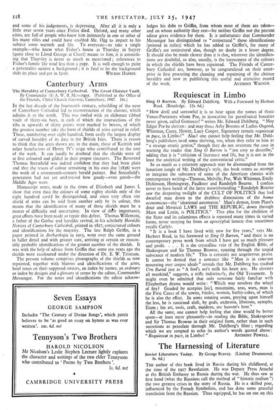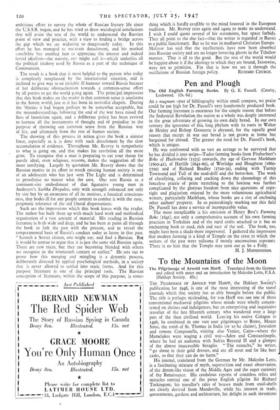The Harnessing of Literature .
THE author of this book lived in Russia during his childhood, at the time of the 1917 Revolution. He was Deputy Press Attache at the British Embassy to Russia during the war. He thus saw at first hand (what the Russians call the method of " historic realism ") the two greatest crises in the story of Russia. He is a skilled poet, influenced by the French Symbolists, and has done some graceful translation from the Russian. Thus equipped, he has set out on this
ambitious effort to survey the whole of Russian literary life since the U.S.S.R. began, and he has tried to draw sociological conclusions that will assist the rest of the world to understand the Russian point of view and practice, with a view to finding a bridge across the gap which we see widening so dangerously today. In this effort he has managed to ma:ntain detachment, and his marked sensibility has enabled him to appreciate the intense and indeed fervid idealism—the naivety, one might call it—which underlies all the political trickery used by Russia as a part of the technique of Communism.
The result is a book that is most helpful to the person who today is completely nonplussed by the international situation, and is inclined to give way to an irritable ill humour toward Russia because of her deliberate obstructionism towards a common-sense effort by all parties to get the world going again. The principal impression that this book makes pn the reader is that common sense is anathema in the Soviet world, just as it has been in revivalist chapels. During the 'thirties it had begun perhaps to be somewhat acceptable, but the misunderstandings following the end of the war have raised the fires of fanaticism again, and a deliberate policy has been revived to harness all the instruments of thought and 'of prejudice to the purpose of throwing out common sense from the Russian way of lile, and ultimately from the rest of human society.
The showing of this process in action gives the book a sinister force, especially as it is done with such detachment by the slow accumulation of evidence. Throughout Mr. Reavey is sympathetic to what is going on, and that makes his revelation all the more grim. To recognise that a man is preparing to cut your throat for purely ideal, even religious, reasons, makes the suggestion all the more terrifying. Largely by quotation Mr. Reavey shows that the Russian motive in its effort to wreck existing human society is one of an adolescent who has just seen The Light and is determined to proselytise no matter what the cost. One sees Russia as a continent-size embodiment of that figurative young man in Andreyev's Sashka Zhegulev, only with strength enhanced not only by size but by an awareness of all its motives, a fanatical conscious- ness, that bodes ill for any people content to combat it with the easy, pragmatic tolerance of the old liberal dispensations.
Such are the impressions which this book leaves with the reader. The author has built them up with much hard work and methodical organisation of a vast amount of material. His reading in Russian literature is bath wide and deep, and he has been at pains all through the book to link the past with the present, and to reveal the temperamental basis of Russia's conduct today as latent in that past. " Scratch a Soviet citizen, one might say, and find a Russian. But it would be untrue to argue that it is just the same old Russian again. There are new traits, but they are becoming blended with others we recognise in the nineteenth century or earlier." He sets out to prove how this merging and mingling is a dynamic process, deliberately directed by applied psychological methods, in a society that is never allowed to settled into static forms. And for this purpose literature is one of the principal tools. The Russian conception of literature, within the scope of this purpose, is some- thing which is hardly credible to the mind fostered in the European tradition. Mr. Reavey tries again and again to make us understand. I wish I could quote several of his statements, but space forbids. They all point to the disc fact—that the writer is regarded in Russia as a public functionary. But so he was in mediaeval Christian Europe. Molotov has said that the intellectuals have now been absorbed into Russian society and are no longer hovering ghosts in the Tchehov manner. That is all to the good. But the rest of the world would be happier about it if the ideology to which they are bound, Ixionwise, were not so primitive. . For that is how we see it through the
oscillations of Russian foreign policy. RICHARD CHURCH.



































 Previous page
Previous page